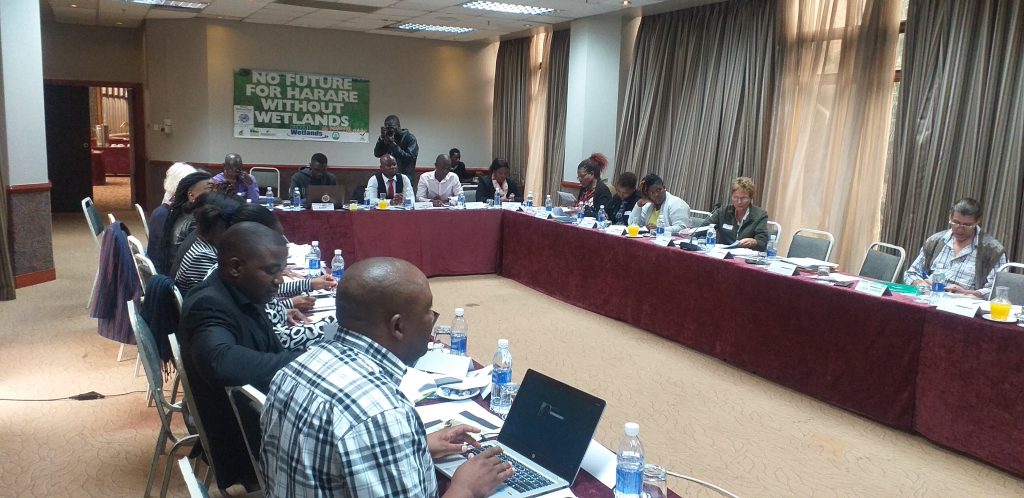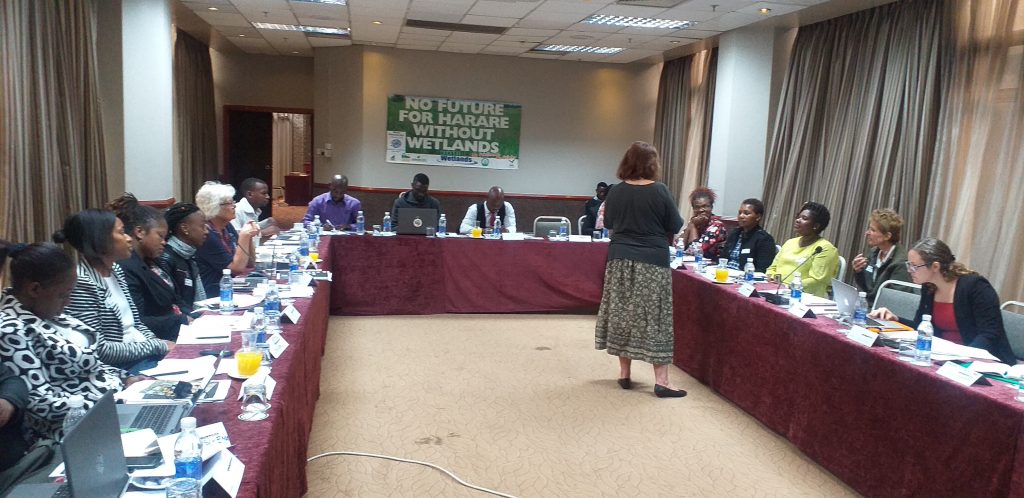The workshop follows HWT’s engagement with the Minister of Environment (on legislative reform) in November 2019.
As part of the objectives the workshop sought to analyze the procedures, problems as well as to propose solutions regarding the protection of Harare’s wetlands while discussing potential areas for legislative reform.
Ecologist, Dr. Rob Cunliffe highlighted that Harare was in ‘a real crisis’ due to the erratic water situation which has been worsened by the continued plunder of wetlands in the capital.
He said that in light of the continued threat to the survival of wetlands (arising mainly from construction and urban agriculture) there is an urgent need to classify wetlands as an integral part of Harare’s water infrastructure.
Human rights lawyer, Fiona Illif submitted that application of the law regarding wetlands protection was lacking adding that there is need to address serious loopholes that continue to lead to destruction of wetlands.
She also noted that there is need to increase access to information by communities ‘as quite often, communities are facing challenges to get the information they need to challenge developments on wetlands’.
The challenges and recommendations regarding protection of wetlands, as outlined during the workshop are captured below;
OVERVIEW OF PROBLEMS
- Too much power vested in the Minister of Environment
- Ministerial appointment of the Environmental Management Agency Board
- Ministerial Directives to EMA Board
- Minister not reporting to Parliament
- Environmental Impact Assessment (EIA) Appeal procedure
- National Environmental Council not constituted
- National Environmental Plan, guidelines for environmental management plans and environmental action plans not developed
- International conventions on wetlands protection not domesticated
- Wetlands not gazzetted
- Wetlands not clearly defined/determined
- Wetlands not specifically recognized and protected as a water resource vested in the President in the Water Act
- Environmental Impact Assessment procedure is conflicted and not independent
- EMA Board limited in jurisdictional capacity to regulate offenders
- There is no accountability in the City of Harare development permit procedure
- City of Harare’s Department of Works is issuing development permits without Environmental Impact Assessment certificates
- Over- emphasis on sustainable development of wetlands over protection of wetlands as a water resource
GENERAL RECOMMENDATIONS
- Mapping of the wetlands with expert input
- Audit to ascertain the current private ownership of wetlands
- Review of National Environmental Plan
- Development of Local Environmental Action Plans (LEAPS)
- Minister to submit reports on the activities of the Environmental Management Agency (EMA) and the state of the environment
- Constitute a National Environmental Council
- Establish Environmental Tribunal for hearings on environmental management and appeals from the decisions of the Director General
- Establish specialized Environmental Police Unit with greater enforcement powers
LEGISLATIVE REFORM RECOMMENDATIONS
- Domestication of Ramsar Convention and Convention on Biodiversity
- President to expropriate wetlands in the public interest (Water Act, Environmental Management Act)
- Wetlands need to be established as protected water resource, not land (Water Act)
- Minister to declare wetlands as ecologically sensitive areas (Environmental Management Act)
- Statutory Instrument/General Notice gazzetting wetlands
- Development on wetlands suspended pending legal challenges. Local planning authorities prohibited from granting development permits on wetlands
- Legislation to be incorporated in a consolidated Wetlands Act with all relevant existing legislation cross-referenced in the Act
- There is an imperative need to work on a Statutory Instrument (through the Environmental Management Act) on the protection of wetlands
- There is need to increase awareness on the importance of wetlands
- City of Harare needs to effectively implement the Environmental Management by-laws once they are gazzetted
Other recommendations that came out from the workshop included the need for increased coordination between government ministries, the Environmental Management Agency and the City of Harare.
Post published in: Featured




Mapping out is very important and that means drilling if it is to be accurate. When certain areas in Borrowdale were drilled no water was found below a certain level which means that what is being labelled as wetlands there is incorrect. This of course was done to stop the Mall of Zimbabwe as it would put another mall in the shade. Now ref that other mall why does water have to be pumped out of that area regularly and why if not pumped does it comes up through the floors in that mall?
I think you need a geologist or a hydrogeologist to explain to you what constitutes a wetland. Drilling is not the way to prove a wetland.